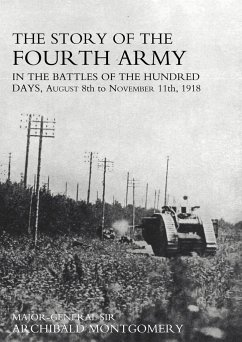Britain's Fourth Army, under Gen. Sir Henry Rawlinson, was the force that bore much of the brunt of the campaign that this official history calls 'the Hundred Days' - the great counter attack beginning on August 8th 1918 which finally forced the German command to sue for the Armistice that came into effect on November 11th, ending the Great War in the west. Germany's commander Gen. Paul von Hindenburg called August 8th 'the black day of the German army in this war' and it was indeed the beginning of the end. The high tide of Ludendorff's Spring Offensives had been halted just before the vital cathedral city and road and rail junction of Amiens, and on August 8th, spearheaded by Australian troops and a strong force of tanks, the Allies hit back. New tactics had at last been learned after the futile offensives of 1915,1916, and 1917, and the Allied troops moved forward under the cover of 'creeping barrages' in small, fast-moving groups tasked to achievable 'bite and hold' operations. When resistance stiffened the attack would be broken off and renewed on another part of the line. By such means the seemingly impregnable Hindenburg Line - which made use of canals and tunnels to form a mighty defence barrier - was rapidly broken and the offensive passed into the open country to the east. The final battles fought by the Fourth Army early in November were in near Le Cateau, ironically the site of the battle in 1914 that had begun the war. This history, written by an officer on Fourth Army staff, gives the full story of the campaign, accompanied by many photographs, a separate volume of maps and excellently drawn battlefield panoramas. There are also appendices on German prisoners taken; battlefield casualties; orders of battle; ammunition expended; and accounts of VCs won.
Hinweis: Dieser Artikel kann nur an eine deutsche Lieferadresse ausgeliefert werden.
Hinweis: Dieser Artikel kann nur an eine deutsche Lieferadresse ausgeliefert werden.








